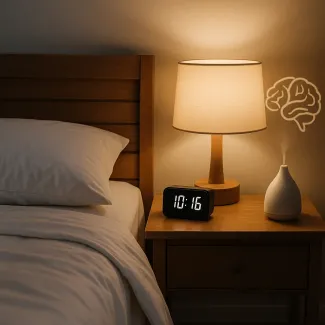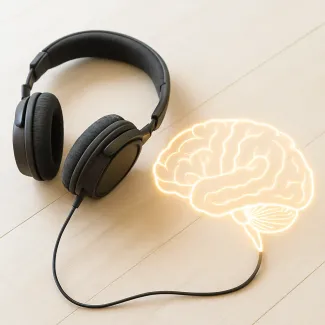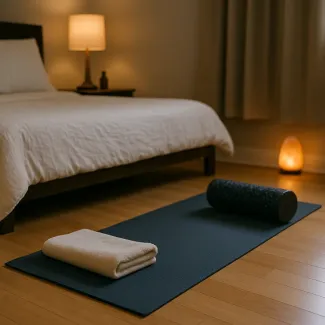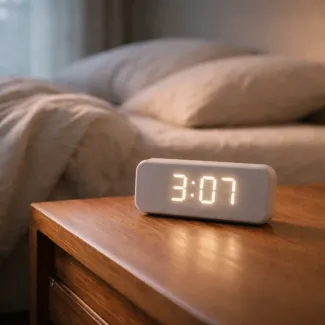
Evening Calm Starts in the Brain: Harnessing Sleep to Regulate Hormonal Stress Response
The hidden hormonal battle happening each night and how sleep can restore balance
When the day winds down and the lights grow dim, your body begins to shift into a state of recovery. Yet for many adults, this transition is not as smooth as it should be. Instead of feeling calm, you may experience mental restlessness, tension in the body, or a racing mind just as you're preparing for sleep. This isn’t just a psychological phenomenon—it’s deeply hormonal. The culprit is often an imbalance in stress hormones, particularly cortisol, which remains elevated at night when it should naturally decline.
This article explores how you can use sleep as a therapeutic tool to lower evening cortisol and related stress hormones—transforming sleep from a passive act into an active agent of hormonal regulation and emotional restoration. With practical insights grounded in biology, lifestyle, and behavioral techniques, you'll learn how to make your evenings a sanctuary for healing, one night at a time.
Understanding cortisol and the evening hormonal shift
Your body follows a 24-hour rhythm known as the circadian cycle, regulated by the brain's suprachiasmatic nucleus in the hypothalamus. This rhythm dictates not only sleep-wake patterns but also hormone production. Cortisol, often labeled the “stress hormone,” is essential during the day for alertness, energy, and metabolism. However, its levels should begin to drop in the evening, allowing melatonin—the sleep hormone—to rise and prepare your body for restful sleep.
When cortisol remains elevated in the evening, it can interfere with melatonin secretion, delay sleep onset, cause fragmented sleep, and exacerbate nighttime anxiety. This dysregulation is often seen in those experiencing chronic stress, burnout, or disrupted work-life boundaries, especially those in high-pressure environments or who work late hours.
Common signs your stress hormones are high at night
You may not be aware that your cortisol levels are elevated in the evening, but your body gives subtle and not-so-subtle cues. Among the most common signs:
- Difficulty falling asleep, even when you feel exhausted
- Waking up between 2–4 a.m., often with a racing mind
- Craving sugar or carbohydrates late at night
- Mood swings, irritability, or a sense of restlessness before bed
- Digestive discomfort, especially bloating or indigestion after dinner
- Heart palpitations or shallow breathing during rest
If you notice these symptoms, they may be your body’s way of signaling an overactive adrenal response, where cortisol and other hormones like adrenaline continue to be released past their intended peak.
The physiology of stress hormone suppression through sleep
Sleep is not simply a passive state—it’s a biological reset mechanism. During deep sleep (particularly non-REM stage 3), the body undergoes critical hormonal shifts that lower cortisol and promote anabolic repair. Melatonin plays a central role here, not just as a sleep initiator but as an anti-stress agent. It directly influences cortisol suppression, immune modulation, and inflammatory balance.
Additionally, the parasympathetic nervous system becomes dominant at night, supporting vagal tone, heart rate variability, and emotional decompression. But these shifts can only occur if the body feels safe, calm, and prepared for sleep—conditions that are frequently disrupted by modern lifestyles.
Why modern habits sabotage hormonal wind-down
The human body evolved with natural light-dark cycles. However, in today’s world of artificial lighting, blue light-emitting devices, late-night emails, social media, and high-stimulation content, the brain receives conflicting signals. Exposure to blue light after sunset can reduce melatonin production by as much as 80%, leading to delayed sleep onset and increased nighttime cortisol.
Moreover, mental overactivity, whether from work stress, doomscrolling, or unresolved emotions, creates a feedback loop that triggers the HPA axis (hypothalamic-pituitary-adrenal system), keeping cortisol levels inappropriately high.
Reprogramming your evening for hormonal calm
To lower stress hormones naturally before bed, the focus should be on creating an internal and external environment that signals safety and rest. This means gradually retraining your body to recognize evening as a time of decompression, not stimulation or productivity.
Start by:
- Dimming lights after sunset to simulate dusk
- Avoiding screens or using blue-light filters 1–2 hours before bed
- Eating your last meal at least 3 hours before sleep to prevent insulin spikes
- Practicing slow, diaphragmatic breathing, which activates the parasympathetic system
- Winding down with rituals—reading, stretching, journaling, or aromatherapy
These behaviors help to naturally shift the autonomic nervous system from sympathetic ("fight or flight") dominance to parasympathetic ("rest and digest") control, which is essential for lowering evening cortisol.
Nutritional strategies to aid cortisol reduction
Food plays a profound role in hormonal balance. In the evening, your diet can either calm the nervous system or stimulate it unnecessarily. Foods that spike blood sugar—such as refined carbohydrates, sugary snacks, or alcohol—may cause an initial sense of relaxation but can lead to blood sugar crashes that activate cortisol during the night.
Instead, emphasize:
- Magnesium-rich foods (pumpkin seeds, spinach, almonds) to support muscle relaxation and cortisol clearance
- Tryptophan-containing proteins (turkey, eggs, yogurt) to boost serotonin and melatonin
- Complex carbohydrates in small portions (quinoa, oats, sweet potatoes) to promote sleep stability
- Omega-3 fatty acids (flax, chia, salmon) to reduce inflammation and support adrenal recovery
Hydration also matters. Dehydration is a subtle stressor. Sip warm herbal teas (chamomile, lemon balm, passionflower) in the evening for a double benefit: hydration and calming botanical compounds.
Movement and timing: when exercise helps and when it hinders
While physical activity is a proven way to lower cortisol overall, timing matters. Intense evening workouts, particularly those involving cardio or HIIT, can spike cortisol and delay melatonin release. This doesn’t mean you should avoid movement entirely at night—rather, shift to calming modalities after sunset.
Ideal evening activities include:
- Slow yoga, especially yin or restorative styles
- Tai chi or qigong, which balance breath with gentle motion
- Leisurely walks, especially after dinner
- Stretching sessions paired with soft music or nature sounds
These forms of movement reduce muscle tension, release endorphins, and signal to your body that stressful output is no longer needed, paving the way for hormonal release and sleep onset.
Breathing techniques to modulate stress hormones before sleep
The way you breathe communicates directly with your nervous system. Fast, shallow breathing can perpetuate sympathetic overdrive, while slow, rhythmic breathing stimulates the vagus nerve, which in turn inhibits cortisol secretion.
Practices such as:
- Box breathing (4-4-4-4 pattern)
- 4-7-8 breath (inhale for 4, hold for 7, exhale for 8)
- Resonant breathing (~5–6 breaths per minute)
… have been shown to lower heart rate, decrease cortisol, and enhance emotional regulation within minutes. Making these part of your nightly routine rewires your stress response long-term.
Environmental design for sleep-induced hormonal reset
Your bedroom is not just a place to sleep—it’s your hormonal reset chamber. A few thoughtful modifications can significantly shift your brain’s interpretation of nighttime cues, guiding it toward calmness and restoration.
Focus on:
- Light: Install warm-toned, dimmable lights. Consider amber night lights for midnight bathroom trips.
- Sound: Use white noise or nature soundscapes to reduce auditory disturbances.
- Temperature: Keep your room slightly cool (~18–20°C / 65–68°F), as this promotes melatonin production.
- Aromas: Diffuse lavender, clary sage, or cedarwood—scents known to reduce nighttime cortisol levels.
Remove electronics or anything that reminds you of work. The mental association of space with stress can undermine even the best sleep hygiene practices.
The role of emotional release in evening cortisol regulation
Unprocessed emotions are one of the most overlooked causes of elevated evening cortisol. Emotional suppression keeps the nervous system activated well into the night, leading to mental rumination, insomnia, and even nightmares.
Developing emotional hygiene before bed is essential:
- Journaling to release unresolved thoughts
- Talking through your day with a partner or friend
- Meditation with emotional labeling (“I feel anxious,” “I feel overwhelmed”)
- Crying if needed—an emotional release that actually lowers cortisol
Even a few minutes of acknowledging what you feel—without judgment—can signal the brain that it’s safe to let go, promoting sleep as a healing phase rather than an escape.
Morning habits that influence your nighttime hormones
What happens in the evening is heavily influenced by what happens earlier in the day. Morning exposure to natural sunlight, even for 10 minutes, resets your circadian clock, which improves cortisol rhythm alignment and enhances melatonin release at night.
Start your day with:
- Natural light exposure within 1 hour of waking
- Hydration to flush cortisol metabolites
- Protein-rich breakfast to stabilize blood sugar
- Mindful morning rituals, such as stretching, gratitude, or grounding
By reinforcing the rise-and-fall pattern of cortisol through consistent morning routines, you set the stage for a smoother hormonal descent each evening.
Supplement support for evening hormonal calm
While lifestyle is the foundation, certain supplements can be helpful when cortisol remains elevated despite behavioral efforts. These natural agents support adrenal health, nervous system balance, and sleep onset.
Common options include:
- Ashwagandha, an adaptogen that lowers evening cortisol
- L-theanine, found in green tea, promotes alpha brain waves and calm focus
- Magnesium glycinate, ideal for relaxation and muscle tension relief
- Phosphatidylserine, shown to blunt nighttime cortisol spikes
- GABA or glycine, which help initiate deep, slow-wave sleep
Always consult a healthcare provider before beginning new supplements, particularly if you're managing other conditions.
Reclaiming your nights as a space for hormonal healing
Evening is more than just the end of the day—it is a biological threshold, a time when your body decides whether to repair or remain in defense. By aligning your habits, environment, emotions, and physiology, you can transform this window into a nightly ritual of hormonal rebalancing.
Sleep is no longer just a necessity—it becomes a powerful therapy, allowing you to reduce cortisol, heal from daily stress, and awaken feeling restored, clear-headed, and emotionally resilient.




